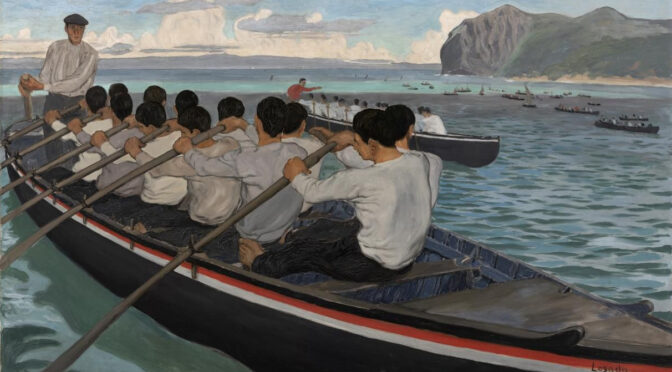Views: 1058
Rowing at sea is the application of the lever principle to move a boat. It’s one of the oldest systems, practiced by peoples all over the world. Rowing was the motor of the past, especially when the wind was not blowing and the sails hung limp. Having strong arms on board was a guarantee of being able to overcome the uncertainties of the sea.
It is believed that the first settlers arrived in Menorca by rowing, bringing their families and domestic animals. They probably navigated relatively close to the coast and made long journeys on calm days, always keeping sight of the new shore they were aiming to reach.
Rowing was also how ancient naval battles were fought. In this case, coordinating many rowers was crucial to covering great distances and moving swiftly when battle tactics required it. Many people were enslaved or condemned to the galleys, thus rowing for the rest of their lives.
One of the keys to efficiently transferring the rowers’ energy into the boat’s movement is maintaining a consistent rhythm. After the oars push against the water, they must be lifted to allow the boat to glide freely before returning together for the next stroke.
But if some oars hit the water at the wrong time, the boat slows down, and the effort is wasted. This is commonly known as “messing up the oars.” This expression is also used colloquially to describe someone who hinders progress while pretending to be distracted.
In Menorca, there have been 24 years of studies analyzing beach overcrowding, so we know which ones suffer from excessive human pressure. However, the Balearic Government now says it wants to conduct its own studies before making any decisions, and they plan to install cameras to count visitors before deciding. Messing up the oars.
The Government has also initiated a process, mainly fueled by propaganda bought as advertising in the media, that aims to gather all political, economic, and social actors in the islands to decide how to address the undesirable side effects of this total focus on tourism. But, mind you, no decisions will be made until they have gathered information, which official statistical institutes have been providing for decades. Messing up the oars.
Closer to home, the Island Council has a publicly funded study showing that Menorca has a 30% excess of vehicles in July and August. The Council has said it will commission another study on the same topic. It won’t be ready until just before next summer, leaving no time to implement any concrete measures. Messing up the oars.
Meanwhile, an emergency decree has been approved, allowing for more parking lots at beaches, new construction in high-risk areas, and exempting large projects from prior environmental impact assessments, which will once again facilitate unfair competition between economic activities…
When the public sector plays this game, it is essential for the people to organize, fix the oars in the rowlocks, and row at a steady pace without messing things up any further.
(This text is an adaptation of the original article published by Miquel Camps, as coordinator of territorial policy for the GOB, in the Menorca newspaper on 19/08/2024).

